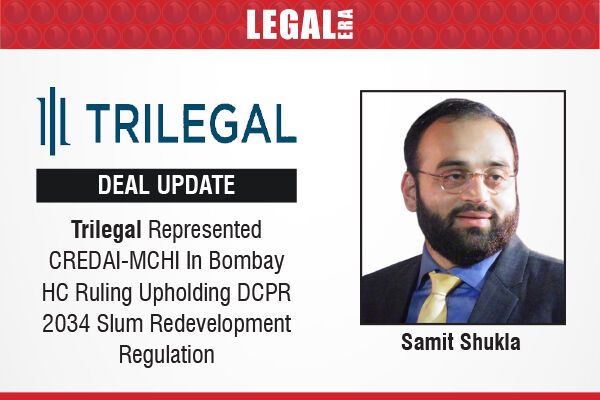
Trilegal Represented CREDAI-MCHI In Bombay HC Ruling Upholding DCPR 2034 Slum Redevelopment Regulation
Trilegal successfully represented CREDAI-MCHI and the Slum Redevelopers Association in a significant constitutional challenge before the Bombay High Court concerning Regulation 17(3)(D)(2) of the Development Control and Promotion Regulations, 2034 (DCPR 2034). The petition was filed by NGO Alliance for Governance and Renewal (NAGAR), an organisation committed to protecting open public spaces.
Matter Overview
The challenged regulation permits the use of reserved open spaces—otherwise non-buildable lands earmarked for parks, gardens, and playgrounds exceeding 500 square meters—for slum redevelopment schemes, subject to the condition that at least 35% of the ground area remains vacant for its original public reservation purpose.
Significance of the Matter
This ruling has significant implications for urban planning, balancing the need for slum redevelopment and shelter for the urban poor with safeguards to protect the city’s green zones. The judgment recognises the need to integrate accountability, transparency, environmental sustainability, and public participation in redevelopment frameworks—ensuring such redevelopment does not degrade the city’s ecological and social fabric.
Constitutional Challenge
NGO Alliance argued that the Regulation diluted the purpose of land reservation, depriving the city of essential open spaces and violating Articles 14 and 21 of the Constitution. The NGO further claimed that the provision contradicted sustainable development goals and should not allow encroached land to override planned public spaces.
The High Court, however, upheld the constitutional validity of the Regulation, holding that it was a reasoned compromise to address both the housing rights of slum dwellers and the need for open spaces. The Court emphasized that unless there is gross violation of fundamental rights or manifest arbitrariness, courts must defer to the policy wisdom of the legislature and executive in matters related to town planning.
Upon analysis under Articles 14 and 21, the Court held that the Regulation does not violate the right to a healthy environment but rather adjusts it to ensure the right to adequate housing for slum dwellers. The Regulation, therefore, stands as a constitutionally acceptable policy measure.
Directions Under Article 226
While upholding the Regulation, the Court exercised its powers under Article 226 of the Constitution to direct further safeguards:
- The State Government must undertake a policy review of the Regulation.
- The Slum Rehabilitation Association and Municipal Corporation of Greater Mumbai (MCGM) must carry out quarterly inspections of encroachments and geo-tag all plots designated as open space in the sanctioned Development Plan.
Impact and Obligations Cast on Developers
The Court imposed strict compliance requirements on Developers executing schemes under this Regulation:
- (i) Layout Plan Requirements:
- The minimum 35% open space must be clearly marked in the final approved layout plan at the time of issuing the Letter of Intent (LoI) or Commencement Certificate (CC).
- The plan must specify exact dimensions, location, and orientation of the open space, which cannot be later modified or shifted.
- (ii) Mandatory Pre-conditions for Approval:
- The encroachment must predate the reservation of the land under the sanctioned Development Plan.
- The Collector must certify the unavailability of alternative land, endorsed by the Urban Development Department (UDD).
- A minimum of 35% of the total plot must remain open as one contiguous, accessible, functional parcel, to be:
- Developed as a recreation ground or park, or as per Development Plan use;
- Handed over to MCGM for public use and maintenance;
- Not enclosed or made exclusive to project residents.
- The scheme must be reviewed and approved by a Special Urban Planning Review Committee, to be constituted by the State within 60 days.
(iii) Post-Completion Obligations:
- Developers must handover the entire open space to MCGM or the local authority within 90 days of receiving the Occupation Certificate for the rehabilitation component.
- At the time of handover, the developer must:
- Provide a basic capital grant or maintenance corpus as determined by the planning authority;
- Submit an undertaking to indemnify the authority for three years for any deficiencies in development or maintenance.
The Trilegal team representing the clients was led by Samit Shukla (Partner), and supported by Rohaan Pajnigar (Senior Associate) and Mustafa Nulwalla (Associate).
Click to know more about Trilegal
If you have a news or deal publication or would like to collaborate on content, columns, or article publications, connect with the Legal Era News Network Team and email us at [email protected] or call us on +91 8879634922.